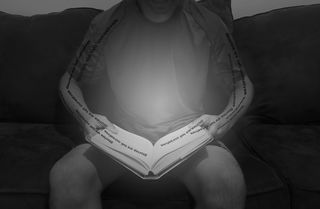Cognition
The Words In Your Story
Research supports the idea of the power of words and the stories one creates.
Posted March 20, 2018

We’ve all heard about the power of words. Many have also probably heard something about how you can change your story, or how the story you tell shapes your life. In this post I hope to bring the power of both together, so one can make significant changes in his or her life, if she so chooses.
We have all likely said things that come back to haunt us, and demonstrate the power of words. Yet, do we really consider much of what we speak? Despite all of the quotes you might have heard regarding the power of words, are you really fully aware of their power?
In an episode of the podcast, “The Hidden Brain”, Dr. Lera Boroditsky discusses experiments which show the power of language to shape not only what we believe, but how we might orient ourselves, both in time and geographically.
Dr. Boroditsky discusses how our culture views time as moving from left to right. If we are given photos and asked to put them in chronological order, we would do so with the seeming oldest photo furthest to the left, and the most recent to the right. However, someone who speaks Hebrew or an Arabic language would organize the pictures from right to left.
To further this, Dr. Boroditsky discusses a culture that uses direction, (north, south, east, and west) rather than left or right. For example, if a bug landed on my left shoulder, members of that culture would indicate which shoulder it was on by the direction I was facing. If I’m facing north and it lands on my right shoulder, they would say it is on my east shoulder. This culture organizes time represented in photos from east to west, regardless of the position they sit in.
Not using terms like left and right may indeed be cumbersome in our culture, but as Dr. Boroditsky points out, that culture is more adept at orienting themselves in the world. Many high functioning adults in this culture have no idea how to orient themselves to direction, and are baffled if told what they are looking for is on the southeast corner of such and such intersection.
More to the point is her study of languages that assign gender to nouns. She studied Italian speakers, German speakers, and speakers who are bilingual in those languages, and asked them to explain why a chair is masculine in their language. Her experiments found that when a language assigns a gender to a noun, people who are monolingual perceive that noun as more masculine or feminine, depending on what gender the language assigns. However, when they spoke both languages (Italian and German assign different genders to the nouns used in the experiment) they were less likely to identify the object as masculine or feminine. She went on to study works of art created by different cultures, and found that with 78% accuracy, she was able to “predict the gender of the personification based on the grammatical gender of the noun in the artist's native language.” (Vedantam, 2018).
In another example, expert, Tiffany Watt Smith, in the podcast, “Decoding Our Emotions, TED Radio Hour”, proclaims in her TED Talk, “…as language changes, our emotions do too.” (Raz, 2018). Guy Raz, summing up her talk, states, “…presumably, our emotions are connected to context, to language, how we frame them.” (Raz, 2018). He and Dr. Smith go on to discuss how emotions are experienced differently as a result of language not only through history, but also in different cultures.
In the podcast, “Invisibilia”, an episode in season 3 called, “Emotions”, the hosts interview an anthropologist who discovered a new emotion when studying a culture in the Philippines. When the emotion was described he couldn’t grasp it, as he’d never experienced anything like it. The two-part show goes on to explore Lisa Feldman Barrett’s explanation that our emotions are a result of our concepts, or the conditioning of culture and our experiences that has resulted in our ideas of what an emotion is. Dr. Barrett posits that, “your brain is wired to feel interoceptive sensations - the sensations from our bodies - as simple feelings of pleasantness, unpleasantness, arousal, calmness.” From there, humans make interpretations of these feelings into emotions, based on personal history and culture.
The point of all this evidence is that if something as intrinsically accepted as emotions are affected by language, then much more may be as well. The idea I’m attempting to transmit is everything is malleable, can be changed, and that you have the power to change your experience by changing your words. The words that are chosen lead to the stories one creates about himself, and about life.
I’ve also written a good deal about the stories we tell ourselves (The Truth Won’t Set You Free, The Big Lie). I’m a firm believer in perception shaping reality, and in the power of the words to shape perception. In the podcast, “Invisibilia, I, I, I. Him”, psychologist James Pennebaker discusses his study that seems to indicate that people who use the pronouns I, me, and my at a higher than average rate are more honest, self-aware, and personal. But they are also more likely to be depressed or depression prone.
The idea that comes to fruition in the podcast is that the goal is to take a more detached view of the particulars surrounding the event and construct a new story. Many people do this at different times, perhaps without realizing it. When a relationship ends we grieve, and the story centers on the loss. Eventually, in healthy grieving, we begin to alter the story, and not focus on the loss, but on the positives. Perhaps the focus is on the personal growth that occurred, the great times enjoyed, or how not being with that individual left one available for the next, better relationship. Perhaps the focus is on what was learned. The story changes, and one feels better.
The ending of a relationship isn’t the only place this occurs. There are numerous examples where changing the story without necessarily being aware occur. Wayne Dyer identifies realizing the gifts hidden in suffering as one of the important factors in becoming enlightened (304). This is related to changing the story. When you see the positives that come out of a negative event, you are changing the story.
Beyond changing the story of negative events, one can realize the story that is being created. For example, what stories do you make up about other drivers when they do something that displeases you? What stories are you creating when you fight with your partner or other loved one? What stories have you created about your job? Your life?
The language used, and the stories created, are what shapes one’s reality. It is natural to do this, and it will never be overcome completely. But one’s life can be improved vastly by considering the power of his words, and looking at how the story is just that, a story, replete with alternative narratives and endings.
Copyright William Berry, 2018
References
Dyer, W. (2007). Change Your Thoughts- Change Your Life: Living the Wisdom of the Tao; Hay House.
Raz, G. (Host) (2018, Mar. 9). TED Radio Hour. Decoding Our Emotions [Audio podcast]. Retrieved from: https://www.npr.org/programs/ted-radio-hour/ on March 14th, 2018.
Spiegal, A., Rosin, H. (Hosts) (2017, Jun 1). Invisibilia. Emotions [Audio podcast]. Retrieved from: https://www.npr.org/templates/transcript/transcript.php?storyId=5309284… on March 14th, 2018.
Spiegal, A., Rosin, H. (Hosts) (2018, Mar 9). Invisibilia. I, I, I. Him [Audio podcast]. Retrieved from: https://www.npr.org/templates/transcript/transcript.php?storyId=5920800… on March 14th, 2018.
Vedantam, S. (Host) (2018, Jan. 29). Hidden Brain. Lost in Translation: The Power of Language to Shape How We View the World [Audio podcast]. Retrieved from: https://www.npr.org/templates/transcript/transcript.php?storyId=5816577… on March 13th, 2018.




